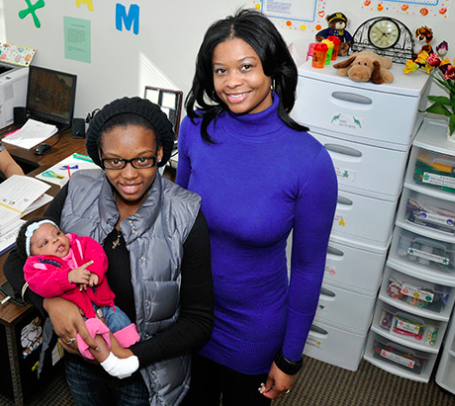Mentoring relationships as a protective factor for pregnant and parenting African-American teenagers
 Klaw, E., & Rhodes, J. (1995). Mentor relationships and the career development of pregnant and parenting African-American teenagers. Psychology of Women Quarterly, 19, 551-562.
Klaw, E., & Rhodes, J. (1995). Mentor relationships and the career development of pregnant and parenting African-American teenagers. Psychology of Women Quarterly, 19, 551-562.
Mentoring relationships as a protective factor for pregnant and parenting African-American teenagers
Problem:
Growing up, African American young women — specifically those who are pregnant or already parenting — disproportionately face a myriad of challenges including racial and gender discrimination as well as economic hardship (Zabin & Hayward, 1993). Despite the odds, many of these women are able to achieve academically and retain optimism about their future (Ahn, 1994; Scott-Jones, Roland, & White, 1989; Upchurch & McCarthy, 1990). Klaw and Rhodes investigate how the support of natural mentors, those that emerge from their own support network, help contribute to the resiliency of these at-risk adolescents.
Methodology:
African- American female adolescents (N=204) were recruited from a school for pregnant and parenting students. The students were interviewed for approximately 2 hours and were questioned on the following topics: mentor support, career aspirations and actual career expectations, current career related activities, beliefs about opportunities for individuals like themselves in their community, and life optimism.
Results:
Over half (57.8%) of the participants indicated that they had an adult whom they considered a mentor in their lives with aunts and grandmothers being the most common natural mentors. Nearly half of the teen girls reported daily interaction with their mentors with most others seeing their mentors at least once a week. Mentor support was found to be significantly related with involvement in career related activities, positive beliefs about community opportunities, and increased optimism. Surprisingly, there was no significant association between mentor support and a decreased career aspiration – expectation gap; accordingly, only 27% reported career expectations lower than their aspirations.
Conclusions:
Overall, this study works to establish natural mentors as an important factor in promoting resiliency across multiple domains for the population of interest. Specifically, the proposed model implies that the support of mentors can positively influence optimism by both increasing career-related activities and belief in positive opportunities.
Implications:
By moving beyond the limits of a deficit-oriented approach, Klaw and Rhodes are able to highlight the strengths and uncover the utility of natural mentors as a support mechanism for this frequently discriminated against group of African American adolescents. Although other important factors such as health and child care, and opportunities for education and employment are necessary, natural mentor relationships are thought to be particularly influential in African-American families due to the emphasis placed on kinship networks (Hill, 1972; Taylor, Casten, & Flickinger, 1993; Wilson, 1986) thus increasing their role as a potential protective factor and should therefore be considered for future interventions.
Summarized by Laura Yoviene, Ph.D. student in Clinical Psychology









